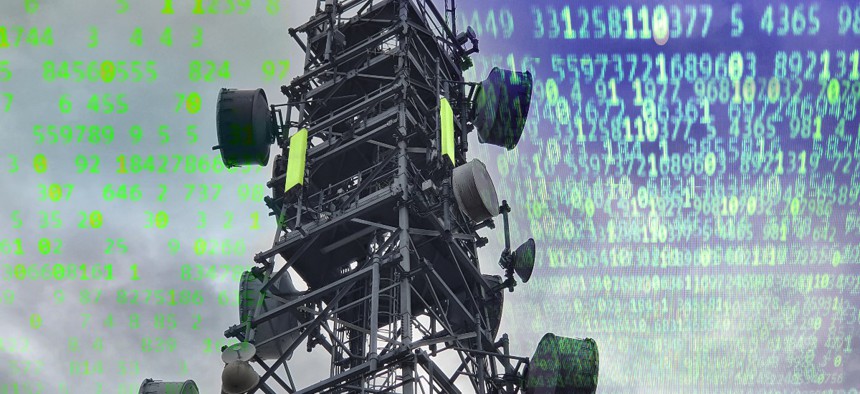Ligado’s 5G Network Will Interfere With Some DOD Satellite Services, Report Finds

Busà Photography/Getty Images
The study determined that Ligado’s terrestrial wireless network will not cause ‘significant harmful interference’ for most GPS receivers, but will potentially impact Iridium satellites used by the Defense Department.
An independent technical review of Ligado Networks’ planned deployment of a terrestrial 5G wireless network found that the system would interfere with the Department of Defense’s satellite communication services provided by Iridium Communications, as well as some older GPS receivers.
The report, released by the National Academies of Sciences, Engineering and Medicine on Friday, analyzed potential interference caused by Ligado’s authorized deployment of a terrestrial network that operates near GPS frequency bands and other satellite services. The study, conducted by a committee of experts and sponsored by DOD, was mandated by Congress as part of the 2021 National Defense Authorization Act.
While the study determined that “most commercially produced general navigation, timing, cellular or certified aviation GPS receivers will not experience significant harmful interference from Ligado emissions,” it found that high-precision receivers “used for applications such as farming, geodesy and surveying and sold before about 2012, can be vulnerable to significant harmful interference.” In addition, the report found that Iridium mobile satellite services used by DOD “will experience harmful interference” if they are “within a significant range of a Ligado emitter.”
The Federal Communications Commission in 2020 approved Ligado’s application to develop a 5G terrestrial network in the L-band radio spectrum adjacent to those used for GPS and satellite communications. The National Telecommunications and Information Administration, DOD and other federal agencies at the time urged the FCC not to approve the Ligado order, citing concerns about potential interference to GPS operations. The FCC denied a request from NTIA in January 2021 to stay the order.
DOD said in a press release that the study’s findings were consistent with the agency’s “longstanding view that Ligado’s system will interfere with critical GPS receivers and that it is impractical to mitigate the impact of that interference.”
The NASEM report found that some mitigation procedures proposed in the FCC’s 2020 order “may not be practicable at relevant time scales or reasonable costs due to test certifications and other efforts required.”
An Iridium spokesperson told Nextgov that the study “clearly demonstrates what the rest of the industry has known for years: the prior FCC order failed to fully consider the risk of harmful interference posed to mission-critical satellite systems.”
“Iridium urges the FCC to take swift action to reverse the order before Ligado starts its technical demonstrations this fall,” the spokesperson added.
The NASEM report noted that the committee conducting the review “was not charged with considering whether the FCC reached a correct outcome in authorizing the Ligado system,” and the FCC has not yet commented on the study.
NTIA said in a statement that it “will review this detailed report more carefully, but we believe this offers the commission an important opportunity to reconsider Ligado’s authorization.”
Ligado, meanwhile, said the report confirmed what FCC experts had previously determined, which was that “a small percentage of very old and poorly designed GPS devices may require upgrading.”
“Now that the review is completed, it is our sincere hope the DOD and the NTIA will stop blocking Ligado’s license authority and focus instead on working with Ligado to resolve potential impacts relating to all DOD systems, including but not limited to GPS,” Ligado said in a statement.
Congressional lawmakers opposed to Ligado’s terrestrial wireless network have long been calling for the FCC to stay its 2020 order, and the new report is likely to fuel renewed concern over the national security implications of the network’s deployment.
In a bipartisan letter to FCC Chair Jessica Rosenworcel last month, eight members of the Senate Armed Services Committee—including Chairman Jack Reed, D-R.I, and Ranking Member Jim Inhofe, R-Okla.—asked the agency to reconsider its order granting spectrum rights to Ligado.
“We remain gravely concerned that the Ligado order fails to adequately protect adjacent band operations—including those related to GPS and satellite communications—from harmful interference impacting countless military and commercial activities,” the senators wrote in the Aug. 17 letter.
In a joint statement following the report’s release, Reed and Inhofe—who pushed to include the NASEM review of Ligado’s network in the 2021 NDAA—said that “it has become increasingly clear to us the national security implications of Ligado’s operations pursuant to the FCC’s order.”
“With this new information, we again urge the FCC to stay and reconsider their 2020 order,” Reed and Inhofe added.






